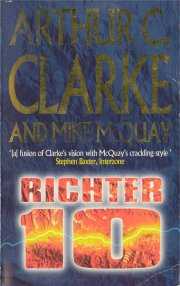Richter 10
| Richter 10 | |
|---|---|
 | |
| Author | Arthur C. Clarke and Mike McQuay |
| Country | United Kingdom |
| Language | English |
| Genre | Science Fiction |
| Publisher | Gollancz |
Published in English | 1996 |
| Media type | Print (Paperback) |
| Pages | 446 pp |
| ISBN | 0-575-60110-8 |
| OCLC | 35017847 |
Richter 10 is a novel by Arthur C. Clarke and Mike McQuay. The protagonist is Lewis Crane, who develops a hatred of earthquakes due to a major earthquake hitting his house when he is seven years old, killing his parents. The book's title is a reference to the Richter scale, on which 10 was considered (when the scale was devised) to be the most power an earthquake was likely to ever have.
The plot deals with predicting earthquakes months or years in advance, and eventually banishing them forever from earth by stopping all tectonic activity.
Plot summary
There are four defining episodes in the story, and a variety of subplots and minor threads — many of them unrelated to the main story. The story begins late in the 20th century, and tracks the life of the main protagonist, Lewis Crane. The first of four episodes opens the story. An earthquake in California in the late 20th century has left seven year old Lewis Crane a crippled, homeless orphan.
The second major episode shows Crane as an adult, world's foremost earthquake expert, a Nobel laureate, and a ruthless scientist and entrepreneur dedicated to relieve the misery of those affected by earthquakes. He is also the moving force behind Foundation, an organization dedicated to scientific research on earthquakes. His Foundation has just perfected the technology to predict earthquakes to within minutes of due time, intensity, and geographical areas that will be affected. His first prediction is for Sado island in Japan—most of the island will be destroyed, as will the inhabited village of Aikawa.
Local authorities not only ignore his warnings, but vilify him. On the D-day, he has collected a lot of media and relief organizations to cover the event. Many of them are on a small part of the island that will be safe, according to prediction. Others are covering the event from the air. In a very moving culmination, mayor of Aikawa arrives with police to arrest Crane as a fear monger, and to deport him. That is when the earthquake hits. By the time the dust settles, all of his predictions have come true. And there is a beach where the village of Aikawa used to be.
The third major episode is set in the US. A major quake is to hit the areas around a part of the Mississippi river. A business politician cartel of disbelievers decides to use this prediction to further their interests in the presidential elections due soon. The cartel penetrates the Foundation, and tweaks their field data so the prediction is revealed to be a few months sooner. The cartel wins the elections, and Lewis loses credibility when there is no sign of a quake on the announced date.
A postmortem at Foundation uncovers the data fudging, and the fact that the quake is still due in a few months. After much drama and public relations work, a few people are willing to take precautions, but many are not listening. And authorities are out to silence the fear mongers. The quake hits as predicted, and there is a lot of damage. Lewis emerges a hero and a prophet.
The fourth and final episode involves a bold plan to banish earthquakes from Earth forever by "spot welding" the plates forming earth's crust at about 50 strategic places, thus stopping their movement. This welding will be done by detonating powerful nuclear bombs deep inside the earth with energies directed downwards, with no impact on the surface.
There are two objections from naysayers. First, nuclear bombs are dangerous. Second, will the earth be doomed by stopping all tectonic activity? The story mentions the second argument only in passing, and focuses on the nuclear argument. This is when another long range big quake prediction is made. A few decades hence, a monstrous quake will split much of California from the North American mainland, and make it an island in the Pacific, with massive losses of life and property. But there is a solution. If the first of the 50 odd "spot welds" is done at a certain location in the Western US, and within a certain time window, this disaster can be averted.
Lewis convinces the powers that run the country of the event, and a secret project on the lines of Manhattan Project is conceived for the first "spot weld". Just before the nukes are to be triggered, a terrorist attack on the project destroys the facility. Lewis loses his wife and child in the attack. The book ends with Lewis's suicide by remaining in the quake zone when it finally hits.